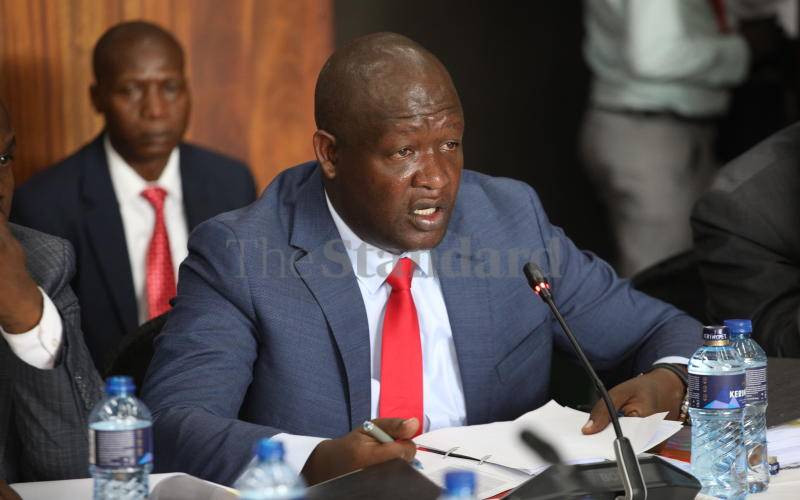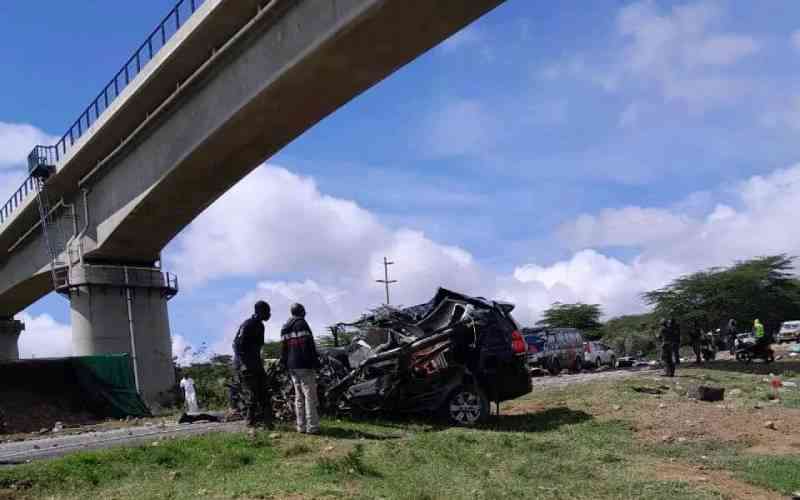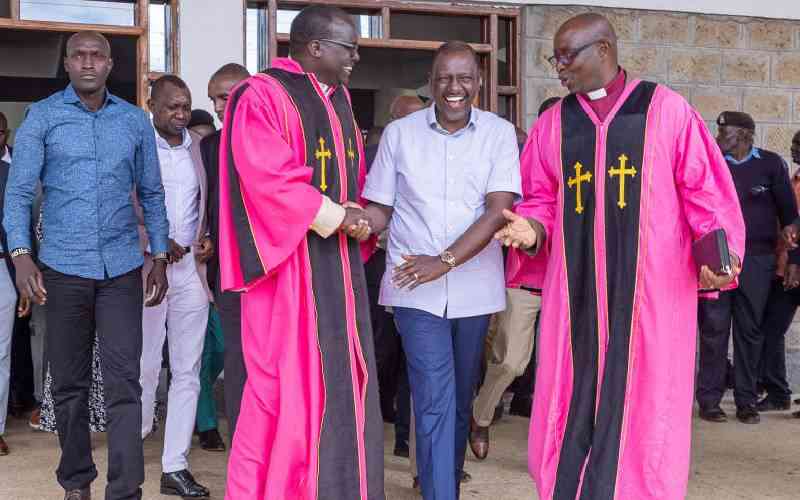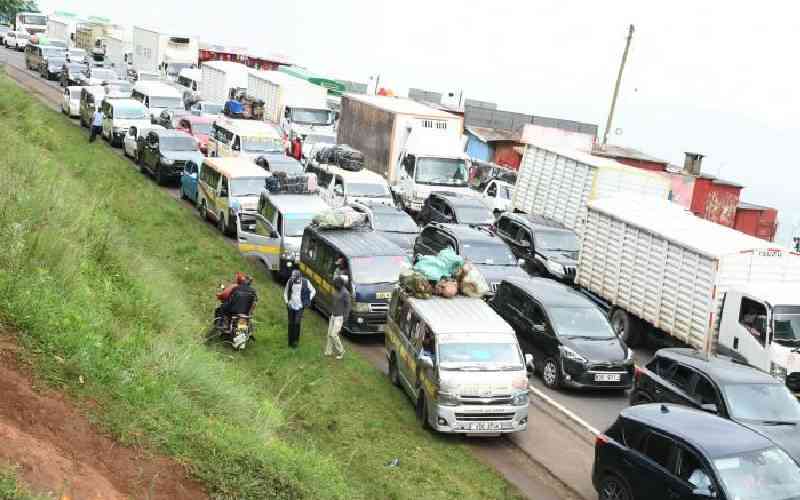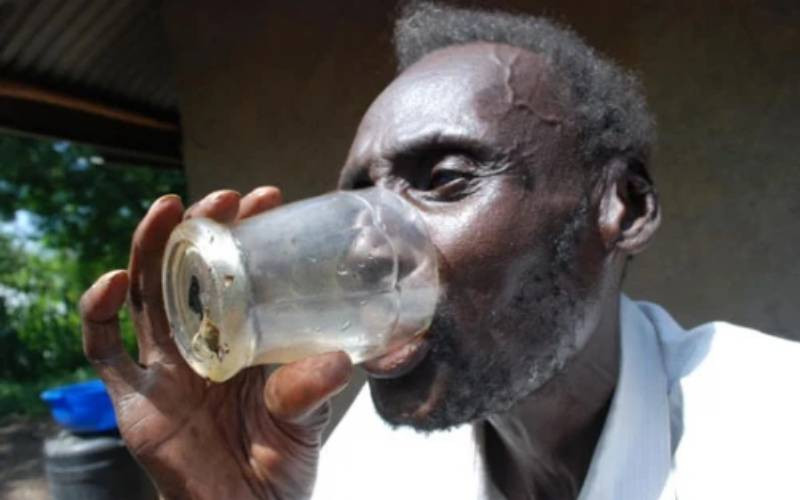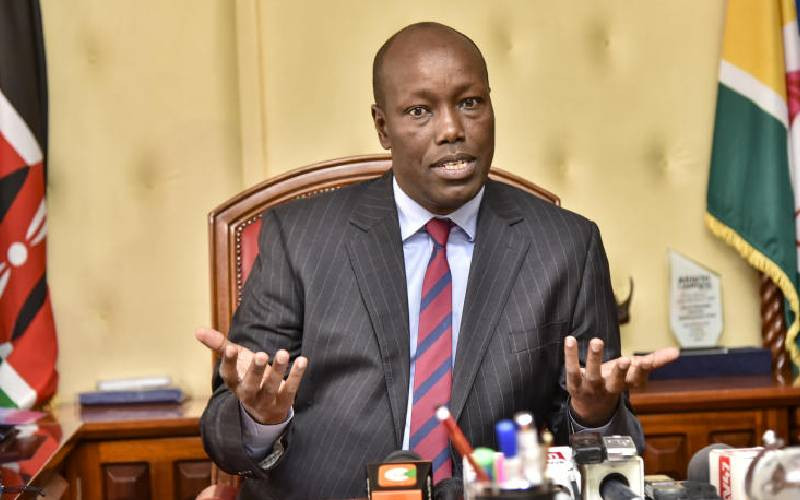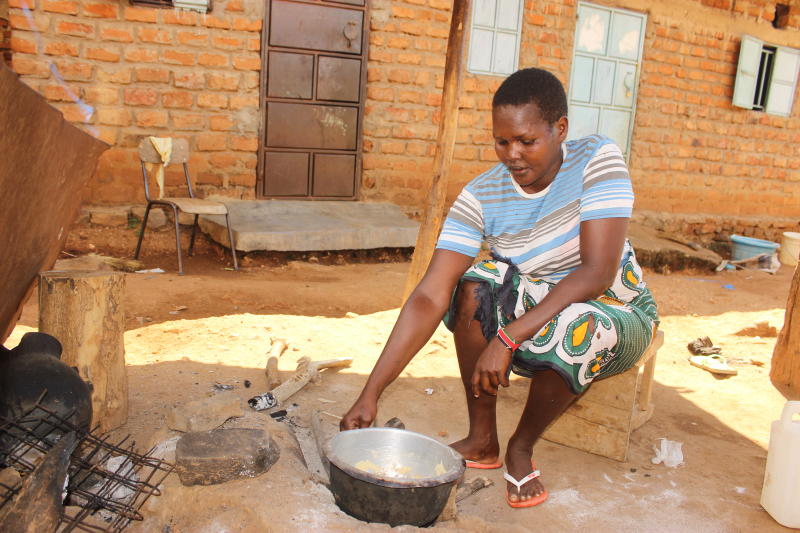
Widow Gladys Changwony at her home in Liter, Marakwet East in Elgeyo Marakwet county on Sunday, October 10, 2021. Ms Changwony's husband Boaz Murkomen was shot dead during a banditry attack in January 2018. [Christopher Kipsang, Standard]
Liter trading centre is deserted after several families fled following deadly banditry attacks.
But Gladys Changwony and a few other locals stay put.
Ms Changwony is desolate. Three years ago, her husband Boaz Murkomen, who was then 38 years old, was shot dead at the family’s farm near the border of Elgeyo Marakwet and West Pokot counties. Changwony was 30 years old then.
She is among hundreds of women widowed after bandits killed their husbands.
Changwony, a mother of six, has been trying to forget the events of March 2018, when she helplessly watched her husband die.
“That fateful day, my husband left the house early in the morning to weed our tomato farm. We were expecting good returns that year. At noon, I heard several gunshots, and a few minutes later, I received a call that he had been shot and injured,” Changwony said.
“I called a boda boda rider, and we rushed him to Kaparon Dispensary. First aid was administered, and I was told to rush him to Chesongoch Mission Hospital for blood transfusion. Along the way, the motorcycle ran out of fuel.”
“My husband died as the rider was waiting for fuel. It was painful. I wish he had not gone to the farm that day. He would be here supporting us.”
She says she depends on casual jobs to fend for her family.
Changwony’s mother-in-law Jeptani Kirop says she lost her eldest son in another attack.
“During the attack, I lost 22 cows and 31 goats. Life has never been the same again. I live in fear because I do not know what will happen next,” she says.
Jeptani says her two sons were planning to build a decent house for her before they were killed.
In the neighbouring Chemasia Village, Lydia Kirop is still mourning. Her husband, Emmanuel Kirotich Kilimo, was shot dead on January 20, 2018, and his 360 cows stolen.
She acquired three cows after the death of her husband, and this later proved costly. Her son Brandon Suter, a Laikipia University student, was killed by bandits while grazing the animals. The raiders also stole the three cows.

Widow Lydia Jepkoech Rop at the grave where her late son Brandon Suter was laid to rest in Marich village, Marakwet East in Elgeyo Marakwet county on Sunday 10 October 2021. [Christopher Kipsang, Standard]
Kilimo, who was killed at the age of 50, was among the richest livestock owners in Kerio Valley. He owned 360 cows and 600 goats. He left behind three widows and 21 children. Other widows are Sally and Monicah Kirotich.
His brother, William Lotuma, was also killed by bandits in 2016. He was 52 years old.
His wife, Linah Kirop, 48, says the bandits suspected to be from the neighbouring Baringo County stole their 250 cows and 180 goats. Lotuma left behind another widow, Everlyne Kirop and seven children.
“He was ambushed by the bandits while herding livestock near Kerio River. The bandits stole the entire herd of livestock. We now depend on the sale of firewood to earn a living,” the widow says.
In Kapchemorkok village in the Kerio Valley, Philaries Cheboi, 44, stares at the fresh grave of her husband, Benjamin Lokore. Anguish is written all over her face. Lokore was shot dead by suspected bandits on June 24, this year.
“My husband was a peace committee chairman in Endo Ward. He was planning a peace meeting when he was shot dead at 10.15 am. We had more than 70 cows, several goats and sheep, which were all stolen on that fateful day. I wish we had sold all of them to pay school fees for our children in secondary schools and college,” Cheboi says.
Her co-wife, Jepkemoi Kipkore, says they lost everything in the attack.
“My husband worked hard. He was rich. He would sell one bull and pay school fees for our children. Now, everything is gone. We do not know where to start.”
Elders say the banditry has got out of hand, and all measures to combat it have failed.
According to Murkomen Kiptoo, 70, an elder from Biyaa village, elders of warring communities would previously broker peace, but it is no longer the case today.
“Youthful bandits have taken over Kerio Valley. The place is now a battlefield. Most parts of the Kerio Valley are deserted. People have migrated to safer areas,” Kiptoo says.
Another elder, Patrick Kisang, 72, who escaped death by a whisker in Murkutwo in 2018, says banditry in Kerio Valley has created a cycle of riches and poverty since 1969.
Displaying scars on his palms, Kisang says he was pursued and shot several times by five armed bandits, who took away his only eight cows.
A man in his early 40s had just been shot dead in the neighbouring Kasang village when we met Mzee Kisang.
“I had lost 18 cows in the early 2000s, and after three years, the bandits stole more cows. It is just a circus,” he says.
“As elders, we have decided to sue the government in an international court of justice. We are consulting lawyers and professionals. The government must compensate the losses.”
In Eldoret, about 125 kilometres away from the Kerio Valley, banditry survivors are nursing gunshot injuries.
They temporarily relocated to the North Rift town to ease access to medical services.
At Jerusalem Estate, two kilometres away from Eldoret Central Business District, Samuel Komen, 42, is bedridden. He was shot nine times on July 20, this year.
“I was herding cattle among a group of men. We did not know the armed men were hiding in a nearby thicket. Suddenly, they started shooting. I was shot several times in the legs, and some bullets exited through my buttocks and hips,” Komen said.
He says he was rushed to the Moi Teaching and Referral Hospital in Eldoret and later referred to Mediheal Hospital, a private facility, where he underwent two surgeries to remove bullets lodged in his right leg.
“I attend regular check-ups, and that is why I decided to live in Eldoret. I pay Sh2,000 during every visit, which is three times a week. The bill shot to Sh1.2 million. The insurance firm paid some amount. I am yet to clear the bill,” he says.
In the same estate, Henry Kipkosgei, 19, had his left leg amputated after he was shot by suspected bandits in July. He says the bullet shattered his bones and veins.
“I had to stay with my uncle in Eldoret for easy access to better medical facilities,” says the teenager who sat his Kenya Certificate of Secondary Education exam at Kerio Valley Secondary School this year.
Laxmana Kiptoo, a professional from the area, said the government could end the banditry menace but has been reluctant for unknown reasons.
Mr Kiptoo said local professionals conduct fundraisers every week to help families bury or treat victims of banditry attacks.
“We have lost people, and many have been maimed, yet the government is silent,” Kiptoo says.
Two weeks ago, Gender and Public Service Chief Administrative Secretary Linah Jebii Kilimo, who comes from Kerio Valley, called a meeting of women widowed by banditry attacks in Elgeyo Marakwet and Baringo counties. Over 200 widows turned up.
“It is women who suffer in cases of banditry and cattle rustling. It is important to use those who have been affected in preaching peace along the Kerio Valley because they are the ones who feel the pain,” Kilimo said.
Elgeyo Marakwet County Commissioner Ahmed Omar and his Baringo counterpart Henry Wafula said security agencies in the region were working round the clock to restore peace.
“We are doing everything possible to ensure communities along the Kerio Valley live in peace,” said Omar.
He, however, did not disclose the death toll arising from the perennial attacks.
But sources within the government revealed that more than 1,500 people could have been killed in Kerio Valley since 1990.
“When you look at the records, the numbers are worrying. There are no official records of livestock stolen, but they are in hundreds of thousands,” the source said. Marakwet East police commander Clement Mbavu says the thickets in Kerio Valley make it difficult to pursue the bandits.
 The Standard Group Plc is a multi-media organization with investments in media platforms spanning newspaper print
operations, television, radio broadcasting, digital and online services. The Standard Group is recognized as a
leading multi-media house in Kenya with a key influence in matters of national and international interest.
The Standard Group Plc is a multi-media organization with investments in media platforms spanning newspaper print
operations, television, radio broadcasting, digital and online services. The Standard Group is recognized as a
leading multi-media house in Kenya with a key influence in matters of national and international interest.

